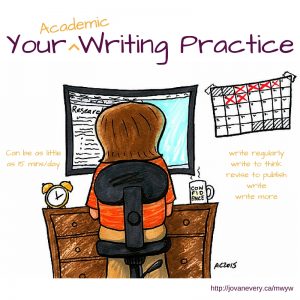Jo VanEvery, Academic Career Guide · When your work doesn’t look like work You’re tired of the popular misconception that ‘academics get the whole summer off’. Are you letting that public perception affect how you work? Are you working indoors at your desk? Are you working during “normal working hours”? Are you avoiding the hammock? The […]
Read More »Developing a Practice: Writing
 Writing is central to your scholarly work and identity. And yet, you struggle to find time and motivation to do it. Posts in this category focus on the process of writing as a whole. They will help you establish an effective writing practice that enables you to pursue your curiosity, create knowledge, and communicate that knowledge through publications.
Writing is central to your scholarly work and identity. And yet, you struggle to find time and motivation to do it. Posts in this category focus on the process of writing as a whole. They will help you establish an effective writing practice that enables you to pursue your curiosity, create knowledge, and communicate that knowledge through publications.
You Need a Writing Practice is a good place to start.
Using all 3 types of writing time will help you imagine how you can fit writing in even when you are also juggling teaching, meetings, and so on. It also helps you understand how your writing practice may shift with the seasons of the academic year.
Don’t aim to finish articles in the summer
Jo VanEvery, Academic Career Guide · Don’t aim to finish articles in the summer I was talking to a client about her summer plans. She wants to ‘get a lot of stuff written this summer‘. She has lots of data. She wants to apply for a grant in about 18 months time. And heck, she […]
Read More »Planning your summer writing time
Jo VanEvery, Academic Career Guide · Planning Your Summer Writing Time Here’s an idea for your summer writing: schedule your time as writing retreats. Summer time is different than teaching terms. You have much more freedom about how you schedule your work: For most of you, there are no classes. There are also fewer meetings […]
Read More »Why questions are useful in feedback
Jo VanEvery, Academic Career Guide · Why questions are useful in feedback As I was preparing the first iteration of my class on Dealing With Reviewer Comments, I asked some friends and colleagues to recommend resources for dealing with feedback. That’s how I discovered Liz Lerman’s Critical Response Process. Lerman developed this process for artists, […]
Read More »Your vision guides the writing and the revision
Jo VanEvery, Academic Career Guide · Your vision guides the writing and the revision You’ve worked really hard on this article. The subject is important to you. You have something important to say. It feels urgent. This vision you have for the paper is extremely important. You know what you want to say even if you […]
Read More »Sometimes slow is the only way forward
A few of my clients have been frustrated with their writing progress. This statement is probably true no matter when I utter it. Even if you’ve successfully developed a process that works, sometimes you hit a slow patch. When this happens, your first instinct is to wonder what’s wrong and go looking for a way to […]
Read More »What is an “efficient” writing practice?
A few conversations I’ve had recently, with clients and on Twitter, have reminded me that we have some interesting ideas about “efficiency“. It’s as if you have a gremlin observing your writing practice like a time and motion consultant. Maybe you feel more comfortable printing out articles and making notes by hand in the margin. […]
Read More »Redefine “writing block”
One of my clients is well advanced in her career and currently managing a very large research project. By anyone’s definition, she is successful. She has written and published before. She has things to write about. She knows how to do this. She has experimented with different ways of writing over the course of her […]
Read More »There is no typical week
Some of your work is scheduled. You know that you will be teaching that class every Tuesday at 2 p.m. (or whatever) for the next 10 weeks or so. You’ve probably also scheduled weekly office hours in which you will be available to students for class-related questions or general advising. You might even have taken […]
Read More »Small steps yield big results
Jo VanEvery, Academic Career Guide · Small steps yield big results Whether it’s the New Academic Year or the New (Calendar) Year, you probably have some New Year’s Resolutions! It is tempting to set big goals. However, every big goal is achieved by a set of very small steps. Small steps are much less overwhelming […]
Read More »You can ignore the grading.
Jo VanEvery, Academic Career Guide · You can ignore the grading This post refers to the break between the first and second semesters of an academic year, which in the Northern Hemisphere tends to incorporate the Christmas holidays. Often the exams and assignments that come in at the end of the semester need to be […]
Read More »Making progress on projects
There are two basic ways to approach a writing project. You figure out what the final product will look like and make a plan to achieve it. You start writing. I am reminded of a passage in Alice in Wonderland: “Cheshire Puss,’ she began, rather timidly, […] ‘Would you tell me, please, which way I […]
Read More »

















